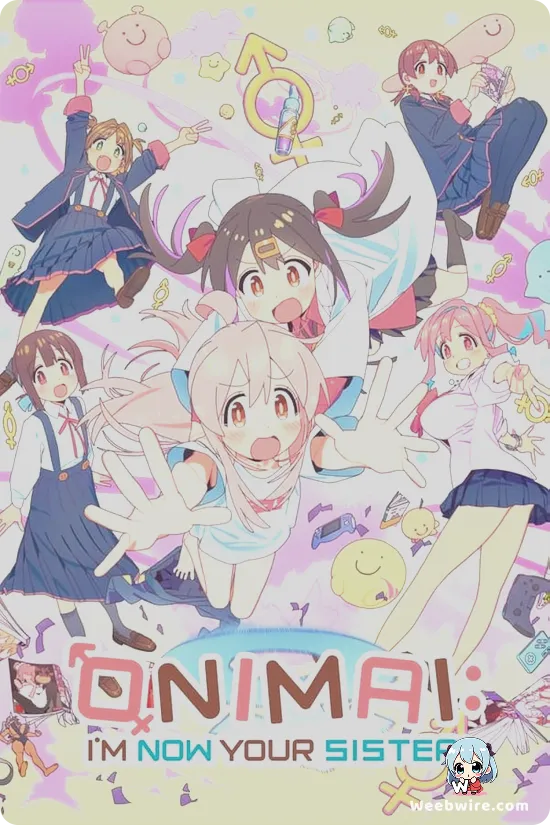
Back to Anime List

© Studio Bindwww.crunchyroll.com
Overview
ONIMAI: I'm Now Your Sister! is a heartwarming comedy and slice-of-life anime that premiered during the Winter 2023 season, based on the popular manga by Nekotofu. The central figure is Mahiro Oyama, a dedicated NEET and otaku who has spent over two years completely isolated in his room, exclusively focused on playing erotic visual novels and shunning social interaction. His reclusive existence is violently interrupted by his scientifically gifted younger sister, Mihari Oyama, who, in a radical attempt at rehabilitation, administers an experimental drug to him. Mahiro awakens the next morning to the shocking reality that he has been physically transformed into a middle-school-aged girl. The series meticulously chronicles Mahiro's subsequent, often awkward, journey of forced social reintegration. Mihari, determined to see her experiment succeed, enrolls him in middle school, forcing him to navigate the complexities of female friendships, gender expectations, and the confusing onset of puberty. The narrative expertly balances situational comedy, derived from Mahiro's internal male perspective clashing with his external female reality, with genuine explorations of sibling bonds and personal growth. Key relationships develop with classmates like the earnest Momiji Hozuki and her older sister Kaede, who help Mahiro slowly overcome his anxieties. Through its twelve-episode run, the anime utilizes its unusual premise as a catalyst for profound character development, demonstrating how severe life changes can unexpectedly lead to breaking self-imposed isolation and forming meaningful connections.
Opinion
ONIMAI: I'm Now Your Sister! is a technically proficient and narratively focused comedy, benefiting greatly from the consistent and high-quality production of Studio Bind. The animation exhibits a polished, bright aesthetic with appealing character designs, perfectly capturing the lighthearted tone required for the slice-of-life genre, and ensuring fluid movement during both everyday interactions and exaggerated comedic reactions. The sound design is robust, highlighted by excellent voice acting; Rie Takashima delivers a compelling performance as Mahiro, successfully conveying the protagonist's internal struggle and humorous frustration with remarkable nuance. Pacing is well-managed, allowing individual episodes to explore Mahiro's adaptation without feeling rushed, while steadily advancing his overall character arc from withdrawn hikikomori to a socially engaged student. Thematic depth resides in its exploration of familial responsibility and the necessity of social connection, utilizing the gender-bending trope primarily as a means of personal rehabilitation rather than pure escapism. While the series maintains a predominantly wholesome approach, its reluctance to delve into the psychological weight of gender transformation—treating it mainly as a comedic plot point—might be perceived as a narrative limitation. Furthermore, some viewers may find Mihari's methods manipulative, particularly her insistence on feminine presentation. Despite these minor criticisms, the character development is strong, particularly the genuine bond forged between Mahiro and his friends, culminating in a satisfying and emotionally resonant conclusion that solidifies its standing as a well-executed contemporary comedy.
Characters
Mahiro Oyama
Voice: Rie Takashima
Kaede Hozuki
Voice: Chie Matsuura
Momiji Hozuki
Voice: Aya Yamane
Mihari Oyama
Voice: Yui Ogura
Asahi Oka
Voice: Shunsuke Kazama
Credits
Studio
Studio Bind
Cover Art
Studio Bind
Publisher
Ichijinsha
Producers
Pony Canyon, Movic, AT-X, TOHO, Tokyo MX, Hakuhodo DY Music & Pictures, BS11, Egg Firm, Ichijinsha, Bit grooove promotion, Pia, Toho Music
Episodes
Season 1
12 episodesInformation
StatusCompleted
Total Episodes12
Duration23 min
Rating7.65
ReleasedWinter 2023
Seasons1
Genres
ComedyEcchiSlice of LifeSchoolShounen
Related Anime

Haikyu!!
Spring 2014★ 9.1
ComedyDrama+3

Hunter x Hunter Story, Characters, Revival News, & Similar Anime
Fall 2011★ 9
ActionAdventure+3

Gintama.: Slip Arc
Fall 2017★ 8.9
ActionComedy+2

Hajime no Ippo: The Fighting!
Fall 2000★ 8.9
ComedyDrama+1

Mob Psycho 100 III
Fall 2022★ 8.9
ActionComedy+4

HAIKYU‼ TO THE TOP Part 2
Fall 2020★ 8.9
ComedyDrama+1